Nursing Theories and Interdisciplinary Collaboration in Healthcare
VerifiedAdded on 2022/09/08
|5
|983
|17
Discussion Board Post
AI Summary
This discussion post addresses the uniqueness of the nursing discipline and refutes the criticism that it borrows theories from other disciplines. It emphasizes that nursing theories are developed based on the nursing paradigm and metaparadigm concepts, reflecting the historical and humanistic aspects of the field. The post highlights the importance of interdisciplinary collaboration in healthcare to address patients' complex needs comprehensively, as nurses often require assistance from other specialists, such as nutritionists and cardiologists, to provide holistic care. It also mentions that collaboration with other disciplines is crucial for patient advocacy, especially concerning social factors and resource allocation. The conclusion reiterates the significance of collaboration for achieving optimal patient outcomes.
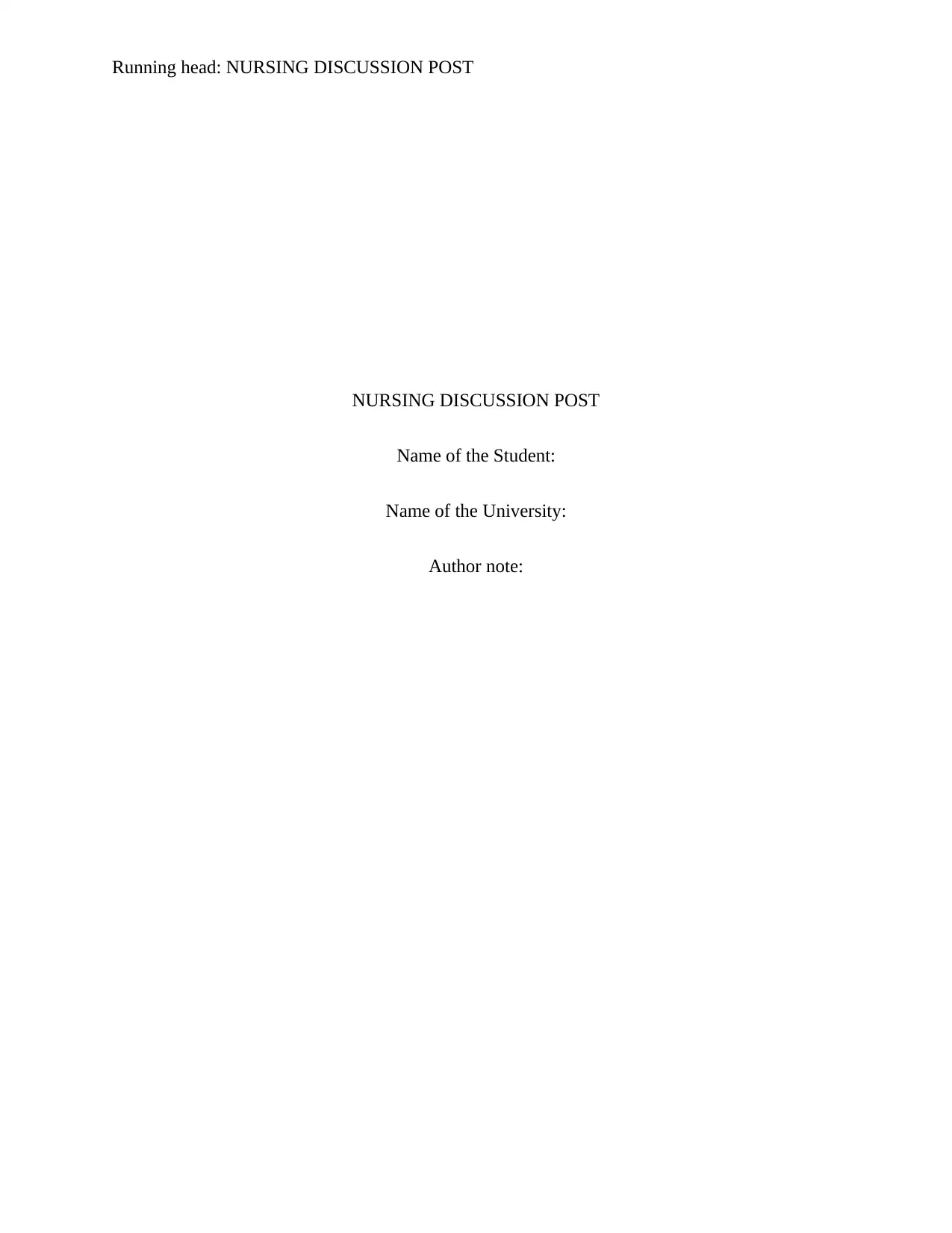
Running head: NURSING DISCUSSION POST
NURSING DISCUSSION POST
Name of the Student:
Name of the University:
Author note:
NURSING DISCUSSION POST
Name of the Student:
Name of the University:
Author note:
Paraphrase This Document
Need a fresh take? Get an instant paraphrase of this document with our AI Paraphraser
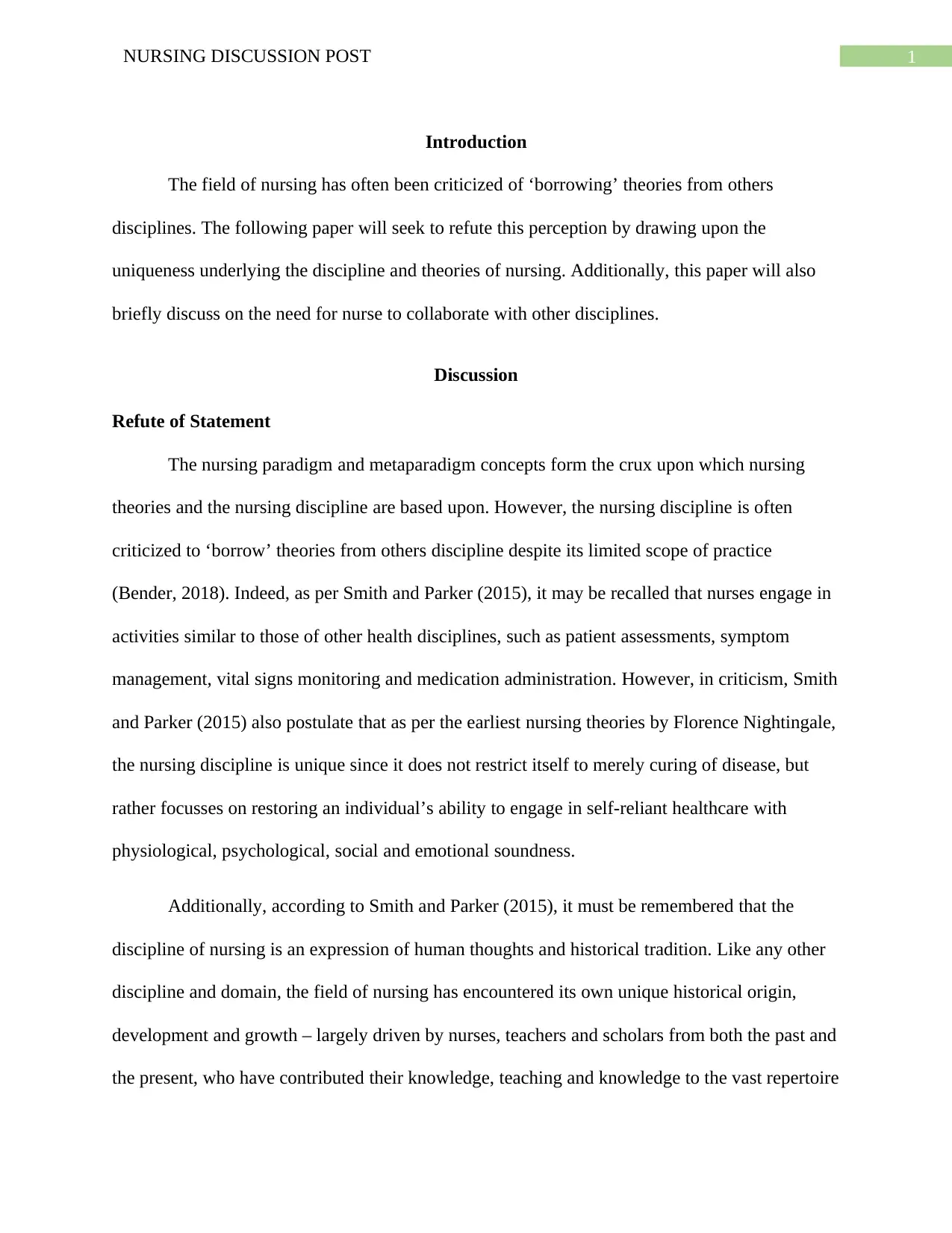
1NURSING DISCUSSION POST
Introduction
The field of nursing has often been criticized of ‘borrowing’ theories from others
disciplines. The following paper will seek to refute this perception by drawing upon the
uniqueness underlying the discipline and theories of nursing. Additionally, this paper will also
briefly discuss on the need for nurse to collaborate with other disciplines.
Discussion
Refute of Statement
The nursing paradigm and metaparadigm concepts form the crux upon which nursing
theories and the nursing discipline are based upon. However, the nursing discipline is often
criticized to ‘borrow’ theories from others discipline despite its limited scope of practice
(Bender, 2018). Indeed, as per Smith and Parker (2015), it may be recalled that nurses engage in
activities similar to those of other health disciplines, such as patient assessments, symptom
management, vital signs monitoring and medication administration. However, in criticism, Smith
and Parker (2015) also postulate that as per the earliest nursing theories by Florence Nightingale,
the nursing discipline is unique since it does not restrict itself to merely curing of disease, but
rather focusses on restoring an individual’s ability to engage in self-reliant healthcare with
physiological, psychological, social and emotional soundness.
Additionally, according to Smith and Parker (2015), it must be remembered that the
discipline of nursing is an expression of human thoughts and historical tradition. Like any other
discipline and domain, the field of nursing has encountered its own unique historical origin,
development and growth – largely driven by nurses, teachers and scholars from both the past and
the present, who have contributed their knowledge, teaching and knowledge to the vast repertoire
Introduction
The field of nursing has often been criticized of ‘borrowing’ theories from others
disciplines. The following paper will seek to refute this perception by drawing upon the
uniqueness underlying the discipline and theories of nursing. Additionally, this paper will also
briefly discuss on the need for nurse to collaborate with other disciplines.
Discussion
Refute of Statement
The nursing paradigm and metaparadigm concepts form the crux upon which nursing
theories and the nursing discipline are based upon. However, the nursing discipline is often
criticized to ‘borrow’ theories from others discipline despite its limited scope of practice
(Bender, 2018). Indeed, as per Smith and Parker (2015), it may be recalled that nurses engage in
activities similar to those of other health disciplines, such as patient assessments, symptom
management, vital signs monitoring and medication administration. However, in criticism, Smith
and Parker (2015) also postulate that as per the earliest nursing theories by Florence Nightingale,
the nursing discipline is unique since it does not restrict itself to merely curing of disease, but
rather focusses on restoring an individual’s ability to engage in self-reliant healthcare with
physiological, psychological, social and emotional soundness.
Additionally, according to Smith and Parker (2015), it must be remembered that the
discipline of nursing is an expression of human thoughts and historical tradition. Like any other
discipline and domain, the field of nursing has encountered its own unique historical origin,
development and growth – largely driven by nurses, teachers and scholars from both the past and
the present, who have contributed their knowledge, teaching and knowledge to the vast repertoire
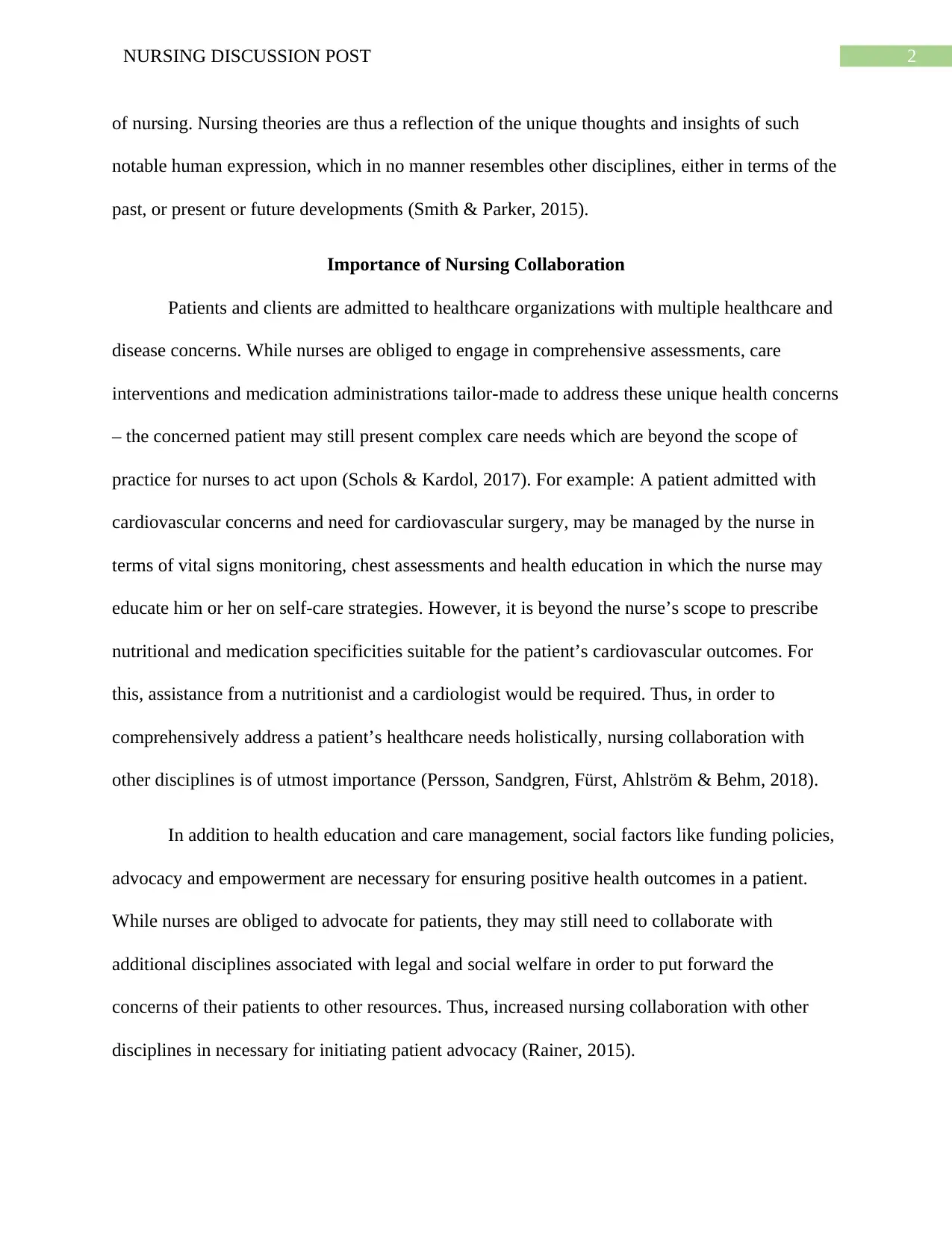
2NURSING DISCUSSION POST
of nursing. Nursing theories are thus a reflection of the unique thoughts and insights of such
notable human expression, which in no manner resembles other disciplines, either in terms of the
past, or present or future developments (Smith & Parker, 2015).
Importance of Nursing Collaboration
Patients and clients are admitted to healthcare organizations with multiple healthcare and
disease concerns. While nurses are obliged to engage in comprehensive assessments, care
interventions and medication administrations tailor-made to address these unique health concerns
– the concerned patient may still present complex care needs which are beyond the scope of
practice for nurses to act upon (Schols & Kardol, 2017). For example: A patient admitted with
cardiovascular concerns and need for cardiovascular surgery, may be managed by the nurse in
terms of vital signs monitoring, chest assessments and health education in which the nurse may
educate him or her on self-care strategies. However, it is beyond the nurse’s scope to prescribe
nutritional and medication specificities suitable for the patient’s cardiovascular outcomes. For
this, assistance from a nutritionist and a cardiologist would be required. Thus, in order to
comprehensively address a patient’s healthcare needs holistically, nursing collaboration with
other disciplines is of utmost importance (Persson, Sandgren, Fürst, Ahlström & Behm, 2018).
In addition to health education and care management, social factors like funding policies,
advocacy and empowerment are necessary for ensuring positive health outcomes in a patient.
While nurses are obliged to advocate for patients, they may still need to collaborate with
additional disciplines associated with legal and social welfare in order to put forward the
concerns of their patients to other resources. Thus, increased nursing collaboration with other
disciplines in necessary for initiating patient advocacy (Rainer, 2015).
of nursing. Nursing theories are thus a reflection of the unique thoughts and insights of such
notable human expression, which in no manner resembles other disciplines, either in terms of the
past, or present or future developments (Smith & Parker, 2015).
Importance of Nursing Collaboration
Patients and clients are admitted to healthcare organizations with multiple healthcare and
disease concerns. While nurses are obliged to engage in comprehensive assessments, care
interventions and medication administrations tailor-made to address these unique health concerns
– the concerned patient may still present complex care needs which are beyond the scope of
practice for nurses to act upon (Schols & Kardol, 2017). For example: A patient admitted with
cardiovascular concerns and need for cardiovascular surgery, may be managed by the nurse in
terms of vital signs monitoring, chest assessments and health education in which the nurse may
educate him or her on self-care strategies. However, it is beyond the nurse’s scope to prescribe
nutritional and medication specificities suitable for the patient’s cardiovascular outcomes. For
this, assistance from a nutritionist and a cardiologist would be required. Thus, in order to
comprehensively address a patient’s healthcare needs holistically, nursing collaboration with
other disciplines is of utmost importance (Persson, Sandgren, Fürst, Ahlström & Behm, 2018).
In addition to health education and care management, social factors like funding policies,
advocacy and empowerment are necessary for ensuring positive health outcomes in a patient.
While nurses are obliged to advocate for patients, they may still need to collaborate with
additional disciplines associated with legal and social welfare in order to put forward the
concerns of their patients to other resources. Thus, increased nursing collaboration with other
disciplines in necessary for initiating patient advocacy (Rainer, 2015).
⊘ This is a preview!⊘
Do you want full access?
Subscribe today to unlock all pages.

Trusted by 1+ million students worldwide
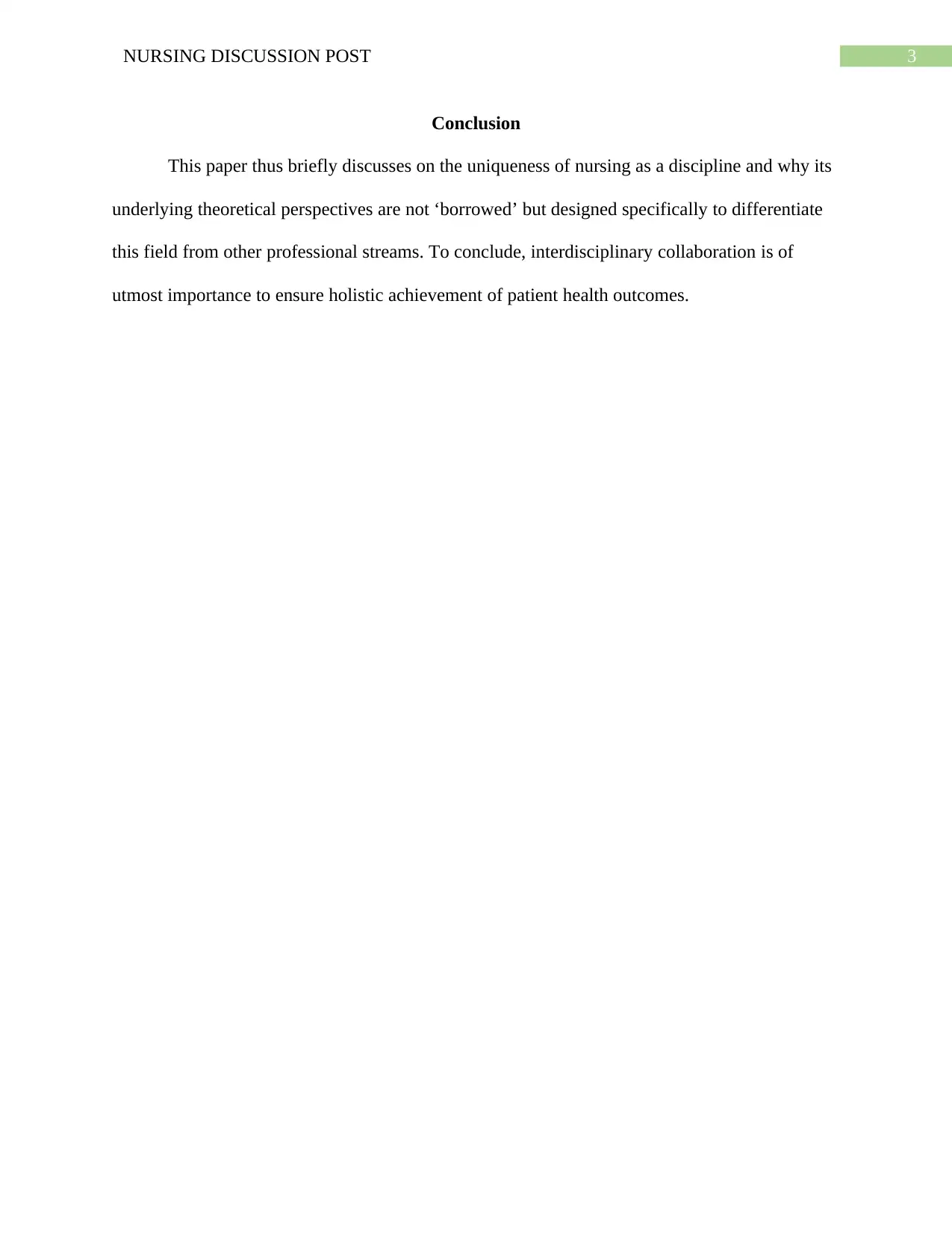
3NURSING DISCUSSION POST
Conclusion
This paper thus briefly discusses on the uniqueness of nursing as a discipline and why its
underlying theoretical perspectives are not ‘borrowed’ but designed specifically to differentiate
this field from other professional streams. To conclude, interdisciplinary collaboration is of
utmost importance to ensure holistic achievement of patient health outcomes.
Conclusion
This paper thus briefly discusses on the uniqueness of nursing as a discipline and why its
underlying theoretical perspectives are not ‘borrowed’ but designed specifically to differentiate
this field from other professional streams. To conclude, interdisciplinary collaboration is of
utmost importance to ensure holistic achievement of patient health outcomes.
Paraphrase This Document
Need a fresh take? Get an instant paraphrase of this document with our AI Paraphraser
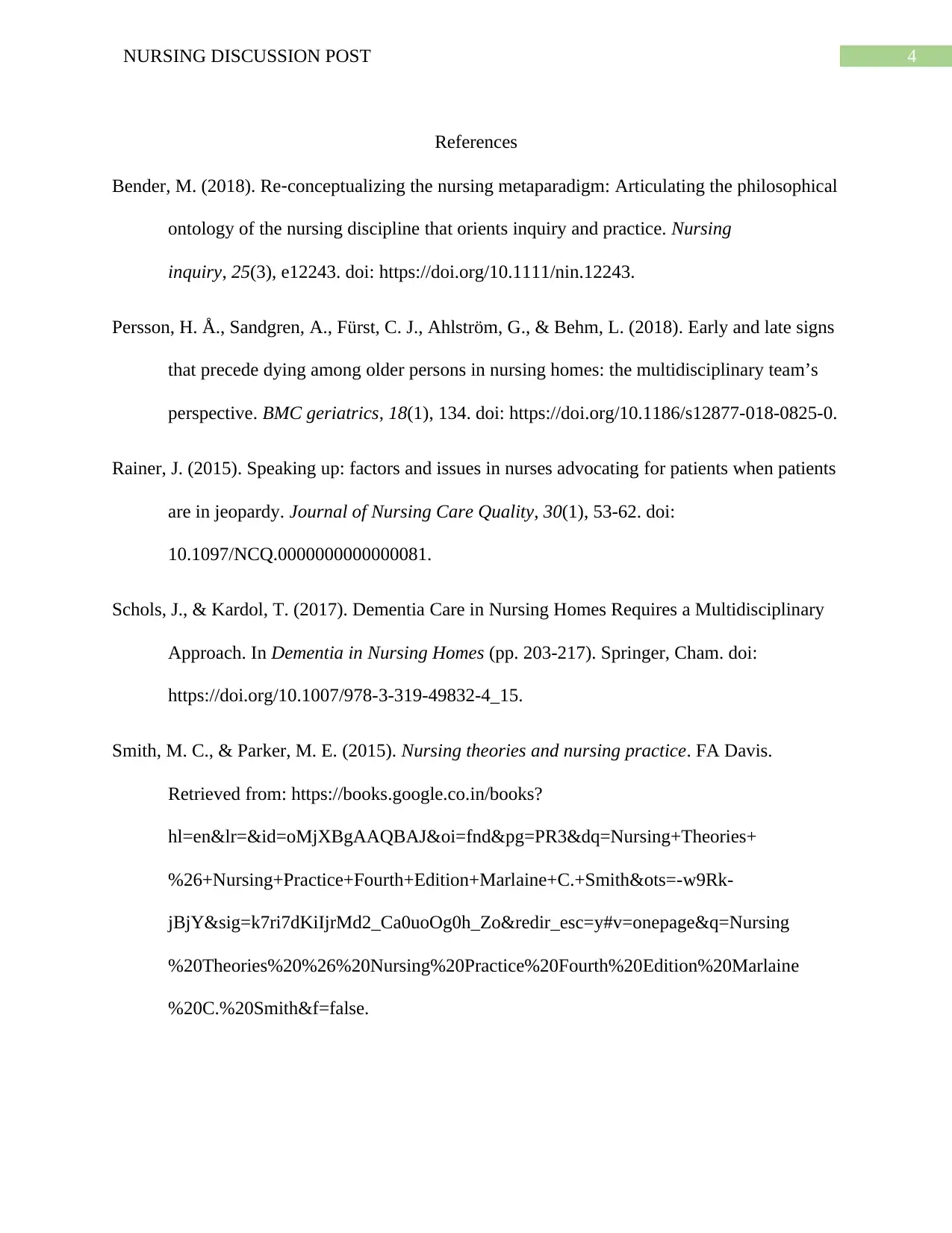
4NURSING DISCUSSION POST
References
Bender, M. (2018). Re‐conceptualizing the nursing metaparadigm: Articulating the philosophical
ontology of the nursing discipline that orients inquiry and practice. Nursing
inquiry, 25(3), e12243. doi: https://doi.org/10.1111/nin.12243.
Persson, H. Å., Sandgren, A., Fürst, C. J., Ahlström, G., & Behm, L. (2018). Early and late signs
that precede dying among older persons in nursing homes: the multidisciplinary team’s
perspective. BMC geriatrics, 18(1), 134. doi: https://doi.org/10.1186/s12877-018-0825-0.
Rainer, J. (2015). Speaking up: factors and issues in nurses advocating for patients when patients
are in jeopardy. Journal of Nursing Care Quality, 30(1), 53-62. doi:
10.1097/NCQ.0000000000000081.
Schols, J., & Kardol, T. (2017). Dementia Care in Nursing Homes Requires a Multidisciplinary
Approach. In Dementia in Nursing Homes (pp. 203-217). Springer, Cham. doi:
https://doi.org/10.1007/978-3-319-49832-4_15.
Smith, M. C., & Parker, M. E. (2015). Nursing theories and nursing practice. FA Davis.
Retrieved from: https://books.google.co.in/books?
hl=en&lr=&id=oMjXBgAAQBAJ&oi=fnd&pg=PR3&dq=Nursing+Theories+
%26+Nursing+Practice+Fourth+Edition+Marlaine+C.+Smith&ots=-w9Rk-
jBjY&sig=k7ri7dKiIjrMd2_Ca0uoOg0h_Zo&redir_esc=y#v=onepage&q=Nursing
%20Theories%20%26%20Nursing%20Practice%20Fourth%20Edition%20Marlaine
%20C.%20Smith&f=false.
References
Bender, M. (2018). Re‐conceptualizing the nursing metaparadigm: Articulating the philosophical
ontology of the nursing discipline that orients inquiry and practice. Nursing
inquiry, 25(3), e12243. doi: https://doi.org/10.1111/nin.12243.
Persson, H. Å., Sandgren, A., Fürst, C. J., Ahlström, G., & Behm, L. (2018). Early and late signs
that precede dying among older persons in nursing homes: the multidisciplinary team’s
perspective. BMC geriatrics, 18(1), 134. doi: https://doi.org/10.1186/s12877-018-0825-0.
Rainer, J. (2015). Speaking up: factors and issues in nurses advocating for patients when patients
are in jeopardy. Journal of Nursing Care Quality, 30(1), 53-62. doi:
10.1097/NCQ.0000000000000081.
Schols, J., & Kardol, T. (2017). Dementia Care in Nursing Homes Requires a Multidisciplinary
Approach. In Dementia in Nursing Homes (pp. 203-217). Springer, Cham. doi:
https://doi.org/10.1007/978-3-319-49832-4_15.
Smith, M. C., & Parker, M. E. (2015). Nursing theories and nursing practice. FA Davis.
Retrieved from: https://books.google.co.in/books?
hl=en&lr=&id=oMjXBgAAQBAJ&oi=fnd&pg=PR3&dq=Nursing+Theories+
%26+Nursing+Practice+Fourth+Edition+Marlaine+C.+Smith&ots=-w9Rk-
jBjY&sig=k7ri7dKiIjrMd2_Ca0uoOg0h_Zo&redir_esc=y#v=onepage&q=Nursing
%20Theories%20%26%20Nursing%20Practice%20Fourth%20Edition%20Marlaine
%20C.%20Smith&f=false.
1 out of 5
Related Documents
Your All-in-One AI-Powered Toolkit for Academic Success.
+13062052269
info@desklib.com
Available 24*7 on WhatsApp / Email
![[object Object]](/_next/static/media/star-bottom.7253800d.svg)
Unlock your academic potential
Copyright © 2020–2026 A2Z Services. All Rights Reserved. Developed and managed by ZUCOL.





